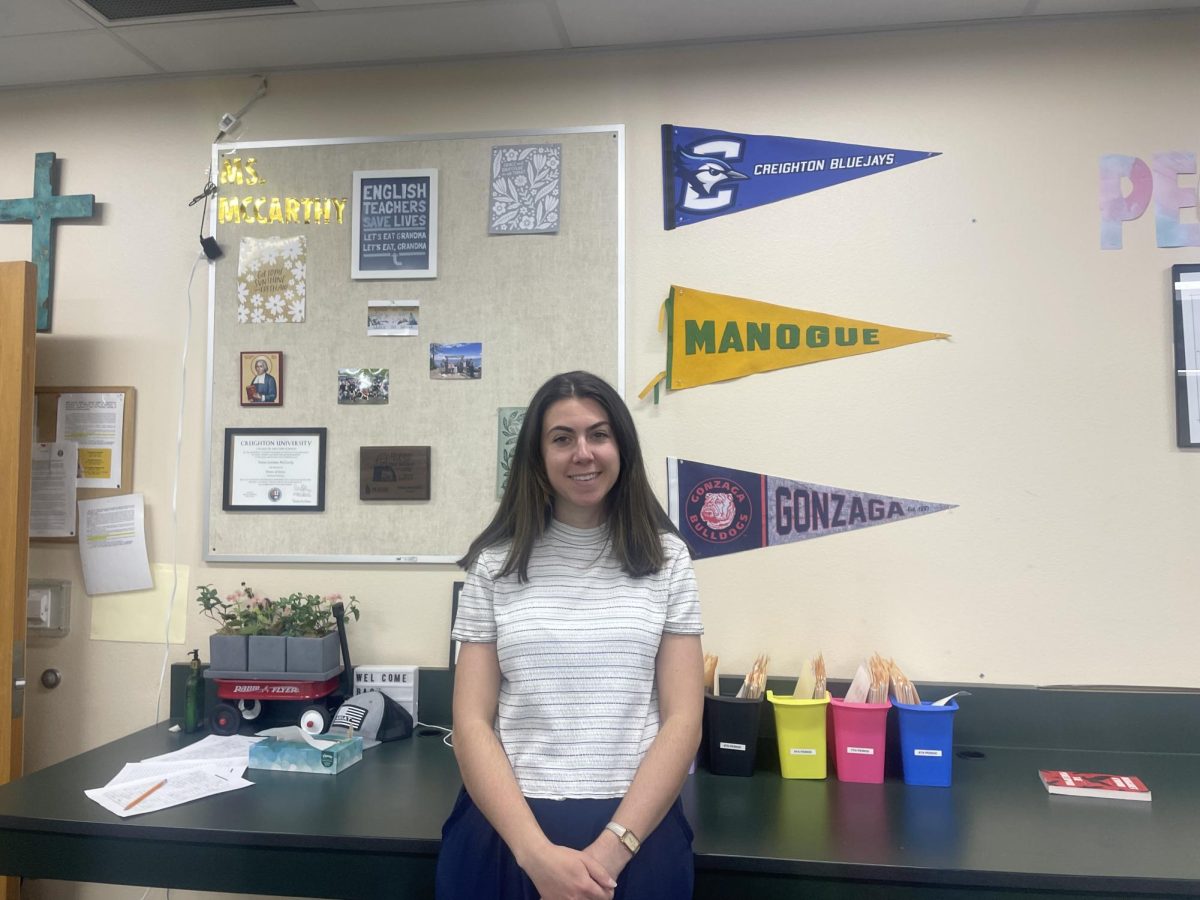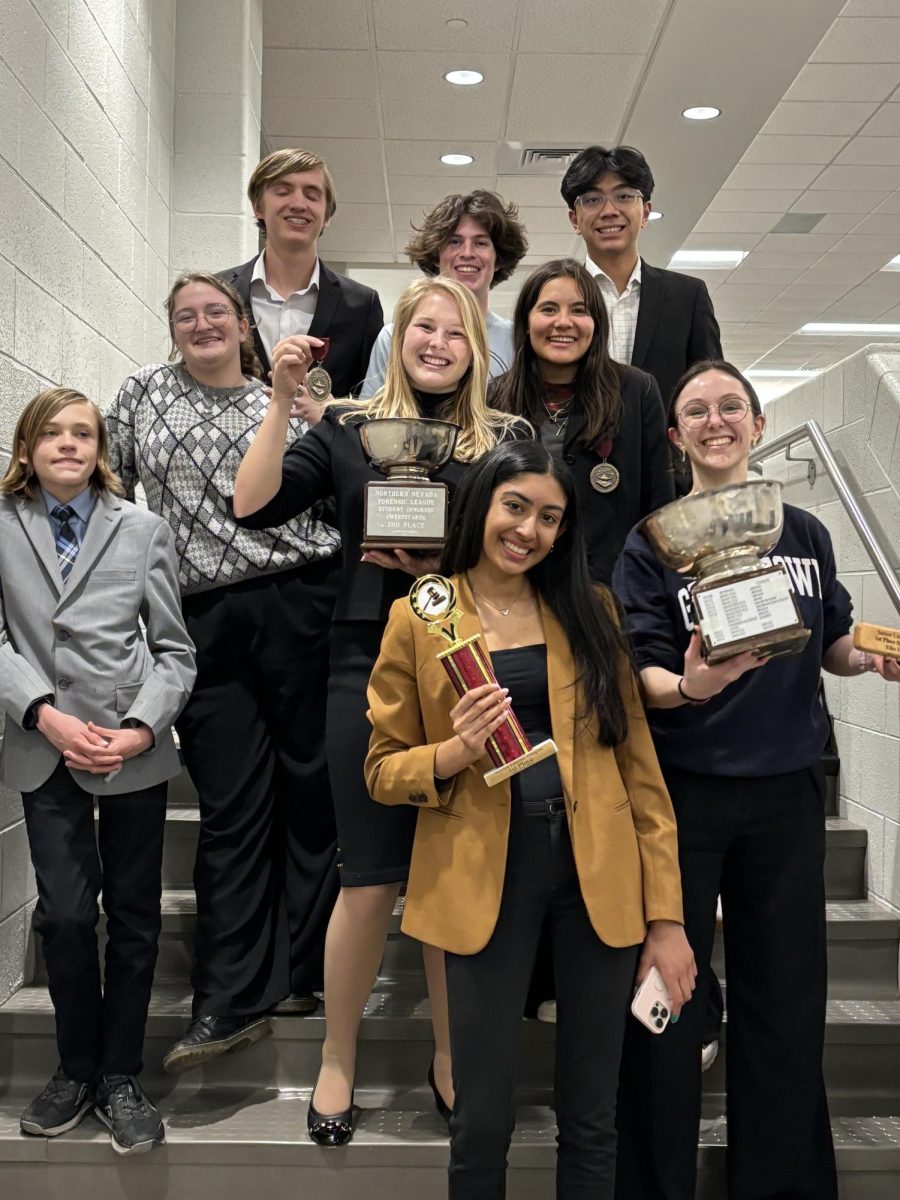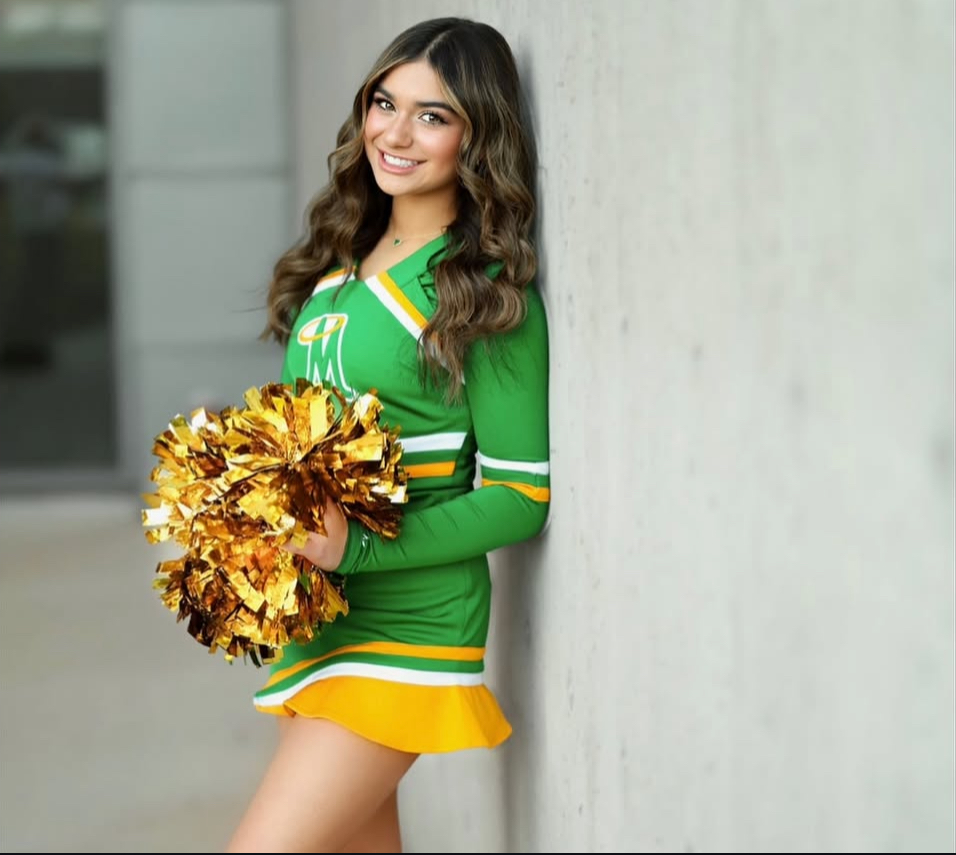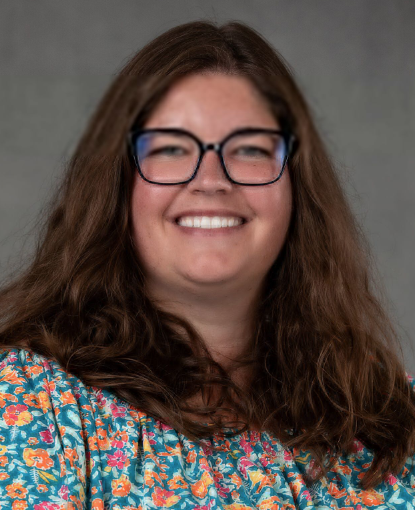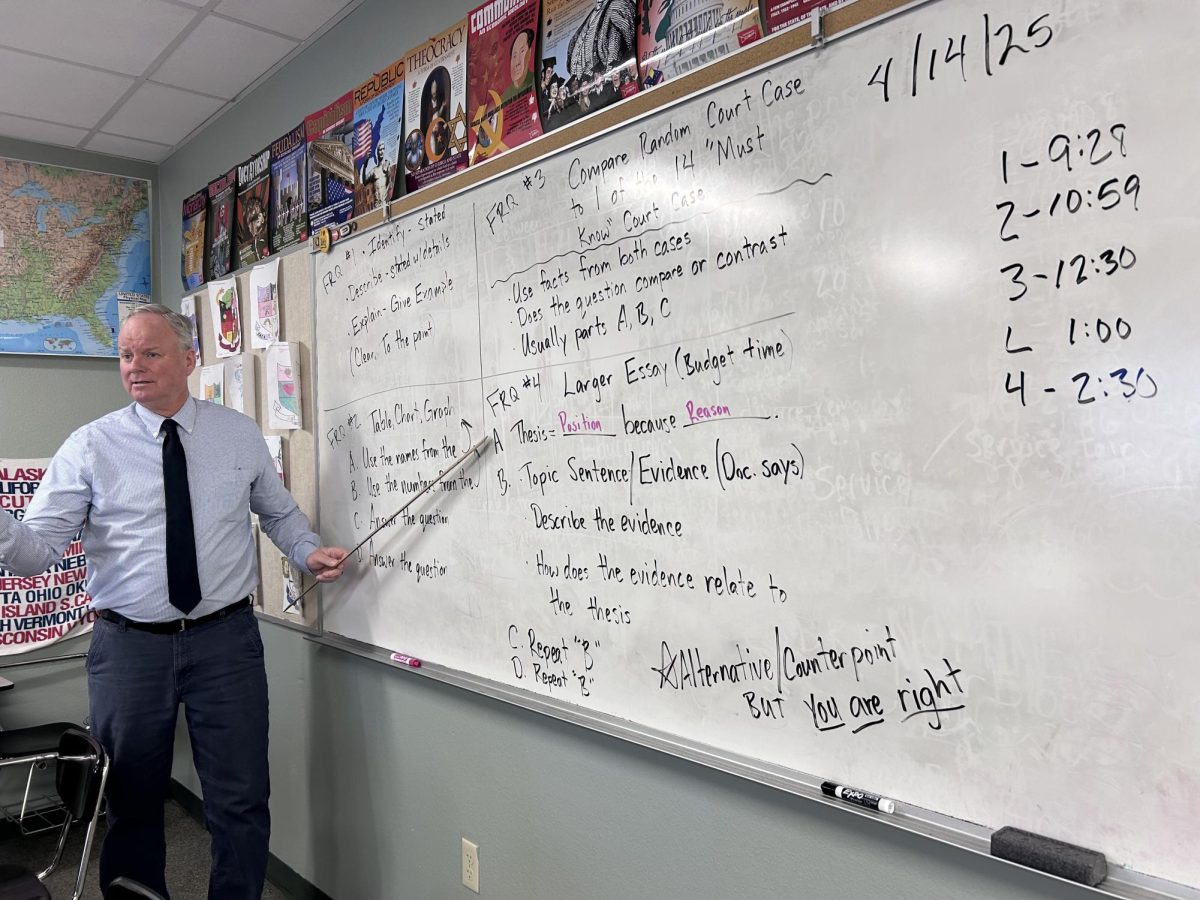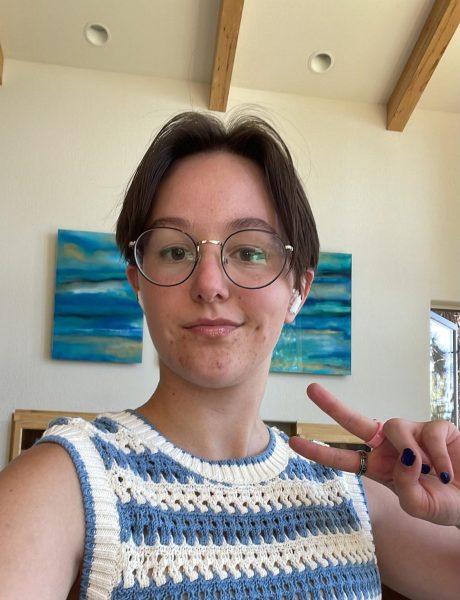Though Teresa McCarthy’s classroom is a windowless interior room, it is full of life. After teaching for almost two years, she has built new connections with the school and grappled with unique challenges facing all teachers now. Ms. McCarthy joined the Bishop Manogue community two years ago, but her family has a deep connection to Reno and the school. “My mom actually grew up here, and she and all of her siblings went to Manogue, and my grandpa went to Manogue,” she tells me. She grew up in California, but came here after teaching for a few years in Arizona.
Her path to teaching started at her high school. She knew then that she wanted to study English, but says she didn’t know what to do with it. A conversation with her English teacher changed her perspective: “If you want a job where every day looks different and is exciting, then become a teacher.” At Gonzaga University, she was given the opportunity to add teaching credentials to her degree, and she took it. Ms. McCarthy says she “fell in love” with teaching from her very first classroom visit as a sophomore, and has been teaching ever since.
At Manogue, she has faced new challenges, namely the introduction of technology into education. Though she had taught for a few years before she moved to Reno, Manogue emphasizes technology more than other schools she has taught at. “They want us to learn more about how to use technology, and new types of technology that we can use to help student learning,” she says.
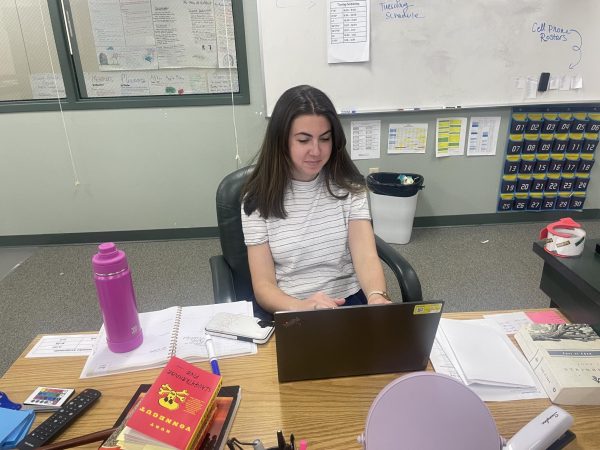
Of course, this emphasis on technology comes at a time where other technology, including generative AI like ChatGPT, poses a threat to education that teachers must address. “This is something that I and I think every other teacher is trying to grapple with because I want to use technology in helpful ways, but we also don’t want students to become too reliant on AI.” Teachers across the country have raised alarm about the possibility of cheating using AI tools, and data from Turnitin has determined that 11% of assignments submitted in the past year contained 20% or more AI-generated material. However, Ms. McCarthy emphasizes that the harms of AI on education extend beyond just cheating. “I think also the harder part is the lack of creativity,” she says. “I think even along with basic skills that they’re losing, they’re losing the ability to be creative and come up with ideas on their own.” This aligns with current data that establishes that most students use AI for brainstorming or gathering of information, rather than to write entire assignments.
Ms. McCarthy has known since the beginning of her teaching career that this job requires flexibility, so she is already working to address the changes AI is making in her classroom. “I try with any assignment specifically that calls for creativity or that needs a student’s personal experience or thought, having that be away from technology, whether we’re reading physical things or writing things with pen and paper.” She hopes that reintroduction of physical media encourages students to use their own creativity, rather than AI, to brainstorm. “I think moving forward, it’s hard because I don’t want to totally throw out technology because I think that it’s useful. When is it appropriate to use technology and when is it more appropriate to have things in hardcopy?” This balancing act is something nearly all high school teachers are trying to sustain.
In the past year, Ms. McCarthy has also gained a new responsibility as coach of Manogue’s speech and debate team. She admits, “I’m going to be honest, it was more of a volun-telling. We needed a coach.” Since then, though, she has learned a lot from her students and the program. “I was fascinated by the whole world of debate, like the format that students have to prepare for,” she says. To her, speech and debate emphasizes the concept of line of reasoning, something that typically isn’t taught until junior-year English. “Line of reasoning is probably one of the most important things you can learn in your writing, that when you are writing a paragraph or an essay, there needs to be one really broad thought that is then narrowed down into smaller thoughts, but they’re all connected to each other.” In speech events like extemporaneous speech, competitors have thirty minutes to write a seven-minute speech with a complete and coherent line of reasoning, something Ms. McCarthy marvels at. “Extemporaneous speech reminds me of the importance of having one idea and tracking it all the way through rather than just jumping around to a bunch of different ideas,” she notes. Line of reasoning is similarly important in writing good essays, which is why she is so impressed by the proficiency of speakers who employ it competently.
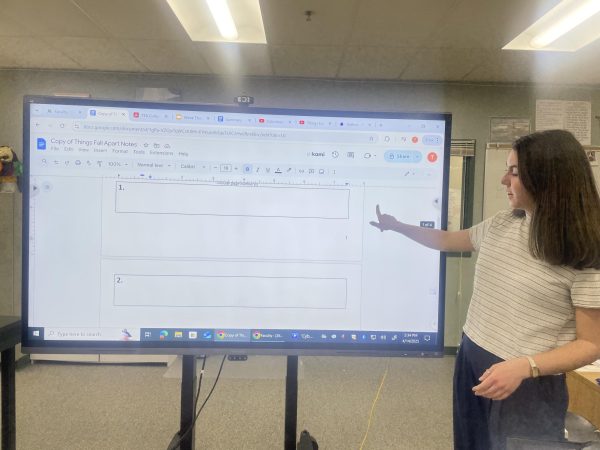
With all the changes she has experienced in the past year, between planning for AI and the speech and debate team, it would be perfectly reasonable to assume that Ms. McCarthy wouldn’t have the time to reassess the effectiveness of her curriculum, but she has. “I think one thing that I definitely want to incorporate more of next year is presentation and speaking skills,” she says. “The art of being able to get up and present are not only lost skills sometimes, but they’re vital in college. 90% of what you’re doing in college is discussing, talking about things, and presenting things, so helping students to develop that voice is incredibly important, because if they don’t have it, then they’re going to get really lost in college and not get the full benefit of their learning experience.”
One specific instance where she plans to incorporate this is in her poetry unit. She admits, “I’ve taught poetry every year that I’ve taught. I personally love poetry, and both years I feel that there’s just something about that unit that has been really flat, or there’s disconnect. So I think that’s where next year I want to incorporate more of the speaking and listening so that students can learn to have more of a voice through poetry.” She notes that many modern poems have recordings of their writers orating them, and hopes that by hearing authors read their own work, her students can build a greater connection with their own poetry.
The past two years have been a time of transition and learning for Ms. McCarthy, but through the love of teaching she’s had since college, she has risen to the challenge. “I’ve definitely grown,” she says. “It’s just the beginning.” Whatever the next few years of teaching have in store for her, she’ll be ready.

